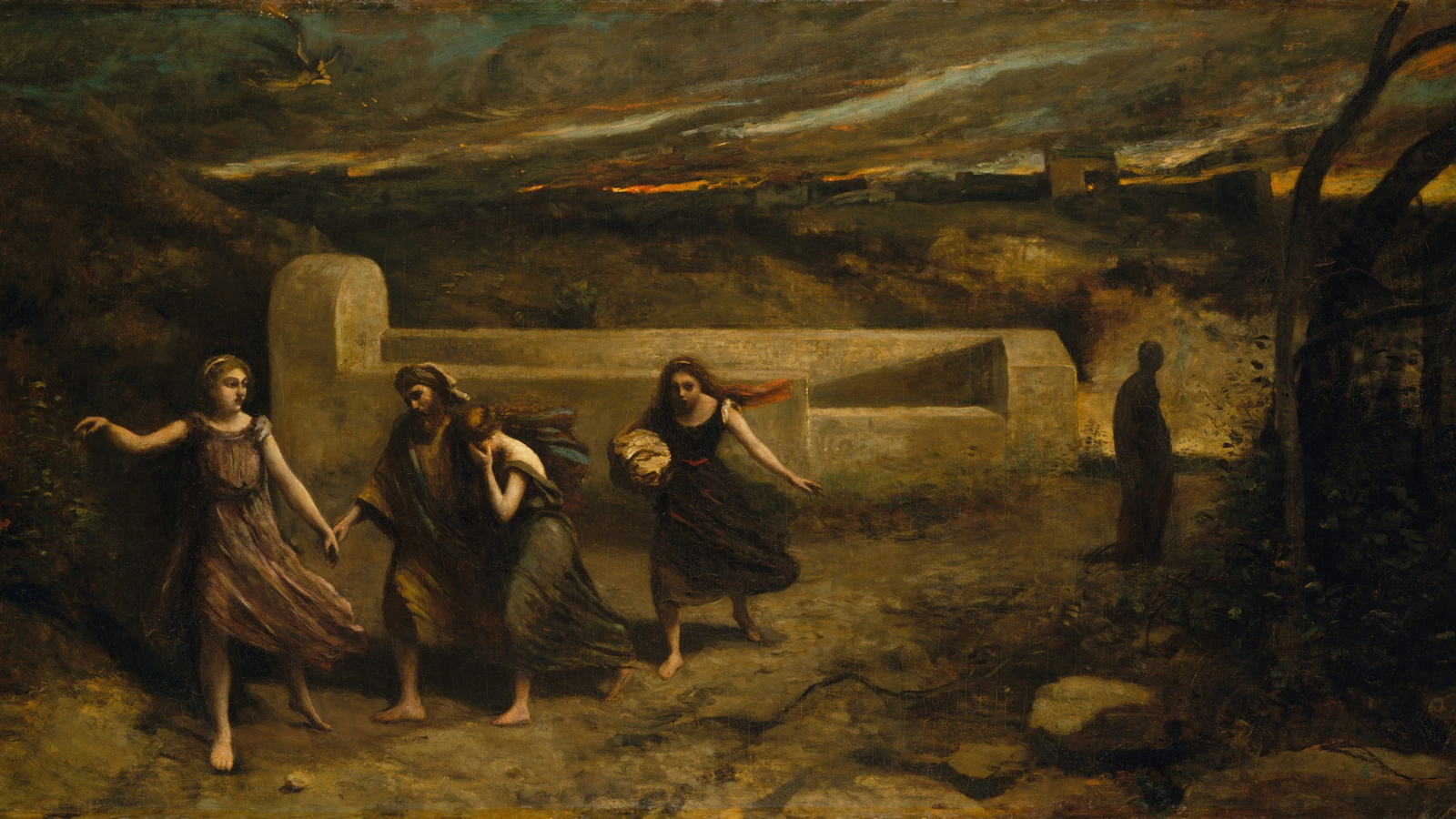Introduction
Alright, let’s get into it: Sodom and Gomorrah. One of the most misunderstood, misused stories in the Bible. People just love to yank this one out as a “clobber verse” against LGBTQ+ folks, as if the point of the story is to condemn queer people. Spoiler: it’s not.
I’m not a Christian anymore, but I still see value in these old stories. I think of them as humans trying to make sense of the world, communicating something real about the human experience. And Sodom and Gomorrah? It’s not about consensual relationships, or “sexual sin” in the way people like to twist it. The story, if you look at it properly, is about power, control, and what happens when you forget what it means to actually love others as you love yourself.
Setting the Scene with Lot and Sodom
The story kicks off with Lot, who’s close to Abraham—a big figure in the Bible. They travel together for a while, but eventually, their paths split, and Lot goes to live in Sodom. Now, Sodom is infamous for its inhospitality. The Bible paints it as a place where people don’t give a toss about anyone but themselves. They’re hostile to anyone different, totally self-obsessed, and have zero interest in showing kindness or compassion.
People love to zoom in on the violence and sex in this story, but Sodom’s real “sin” is that the people there are completely self-centered. They’re the opposite of “love your neighbour.” In Sodom, it’s everyone for themselves, and if you’re not one of them, they see you as fair game.
So, God has a chat with Abraham and strikes up this whole “if you can find one righteous person” deal. God sends two angels to Sodom to see if there’s anyone decent there at all. Spoiler again: there isn’t much decency to be found.
The Sin of Inhospitality—Not Sexuality
Now, here’s where it gets twisted, and where people start making wild assumptions. The angels show up in Sodom, and Lot invites them in. The guy may not be perfect, but he knows how to show some basic hospitality, which is rare in Sodom. But then things get nasty. The townspeople find out there are strangers in Lot’s house, and they form a mob. They try to break down the door so they can rape the visitors. This is about violence, control, and humiliation. Nothing about this is loving or consensual. It’s cruelty, plain and simple.
This part is key: the mob’s intent isn’t about sexual orientation; it’s about power. Back then, sex and power were deeply connected. To dominate someone sexually was to humiliate them, to strip away their dignity. So what the mob wants to do here isn’t remotely about consensual relationships. It’s about using rape as a weapon to dehumanise and control these outsiders.
So when people use this story to condemn LGBTQ+ folks, they’re completely missing the point. This isn’t about gay relationships; it’s about cruelty, power, and the extreme harm that comes from a community obsessed with control over kindness.
Lot’s Extreme Hospitality—and the Dark Side of Power Dynamics
So, let’s talk about Lot. He’s trying to do the right thing by showing hospitality to these visitors, which was a huge deal back then. But things take a seriously twisted turn when he offers up his own daughters to the mob instead. He says, in effect, “Take them, but leave my guests alone.” It’s disturbing, and it’s supposed to be.
This isn’t about Lot being a hero. Far from it. It’s about showing how far gone this place—and maybe even Lot—is when it comes to human decency. Now, seeing women and children as extensions of the father or husband wasn’t unique to Sodom; this view was common throughout ancient cultures. It likely came from a sense of protection in a dangerous world, but that “protection” quickly became control—and control turns into ownership. In this story, we see how that mindset, meant to protect, can rot into something much darker.
Lot, in this moment, is taking hospitality to a perverted extreme, valuing the safety of strangers over his own family. This isn’t righteousness. It’s warped.
Lot’s choice reflects a culture that’s been so corrupted by its obsession with power, control, and rigid roles that it’s completely lost the plot on what “love your neighbour” actually means. This isn’t about protecting others—it’s about playing out a deeply toxic understanding of honour and status at the expense of basic humanity. The mob wants to show dominance through violence, and Lot’s willing to sacrifice his daughters in a misguided attempt to uphold some twisted idea of hospitality. Both sides are rotten.
The Angels Intervene—A Call for Balance
The angels step in and stop both acts of violence. They prevent the mob from assaulting the visitors and prevent Lot’s offer from being carried out. This moment is crucial because it’s a clear message that neither extreme is right. Sodom’s self-centered, violent inhospitality is clearly wrong, but so is Lot’s “hospitality” that sacrifices his family.
The story here isn’t just condemning one group or one action. It’s calling out the entire system of corruption, selfishness, and unchecked power dynamics. The angels’ intervention shows that both the mob’s cruelty and Lot’s twisted idea of self-sacrifice are equally flawed, equally destructive.
This isn’t a story that’s meant to paint Lot as some saintly figure saved for his goodness. Instead, it shows that even the so-called “righteous” are messed up when they’re entrenched in a broken system. The angels don’t save Lot because he’s blameless; they save him because he’s the least broken of a deeply messed-up situation, and even that’s a low bar.
The Aftermath: A Cautionary Tale About Corruption and Power
So, Lot and his family are told to leave and never look back. But even in his escape, things go downhill. Lot’s wife turns around, disobeys, and turns into a pillar of salt. This isn’t just a punishment for looking back; it’s a metaphor for being so entrenched in a corrupt world that you can’t leave it behind, even when salvation is staring you in the face.
Lot eventually ends up isolated in a cave with his daughters. They’re so scarred by the twisted power dynamics they’ve lived under that they think the only way forward is to get their father drunk and bear his children. It’s grim, and it shows how deeply the rot of Sodom’s culture has infiltrated even those who “survived.” They’ve physically escaped, but morally and psychologically? They’re still stuck in the same toxic patterns.
This is where the story lands its punchline, and it’s a bleak one: even survival isn’t salvation if the culture you come from has corrupted everything, even your understanding of family, safety, and love.
Weaponising This Story Against LGBTQ+ People Misses the Point Completely
Now, here’s where I get really frustrated. This story is brutal, yes, but it’s not about consensual love between people of the same sex. The people who weaponise it against LGBTQ+ folks are ignoring the real message and twisting it into a justification for their own inhospitality and judgment. The story of Sodom and Gomorrah isn’t condemning loving, consensual relationships—it’s condemning violence, cruelty, and a society so obsessed with power and dominance that it’s lost any sense of decency.
To take this story, with all its darkness and all its critique of abuse and control, and use it as a weapon against queer people is, frankly, absurd. If anything, those who use this story to justify hostility toward LGBTQ+ folks are closer to the inhospitality and violence of Sodom than anything else. They’re missing the entire point: that power without compassion, self-interest without love, and judgment without understanding will destroy a community from the inside out.
Conclusion: Rediscovering the Real Message of Sodom and Gomorrah
In the end, the story of Sodom and Gomorrah isn’t about condemning love—it’s a brutal reminder of what happens when power and control replace compassion and care for one another. It’s a warning about how communities that build themselves on dominance and exclusion, instead of connection and kindness, are doomed to implode. And maybe that’s the takeaway: love others as you love yourself, with balance and without the need to dominate or control. The real sin here isn’t love—it’s the absence of it.


Leave a Reply